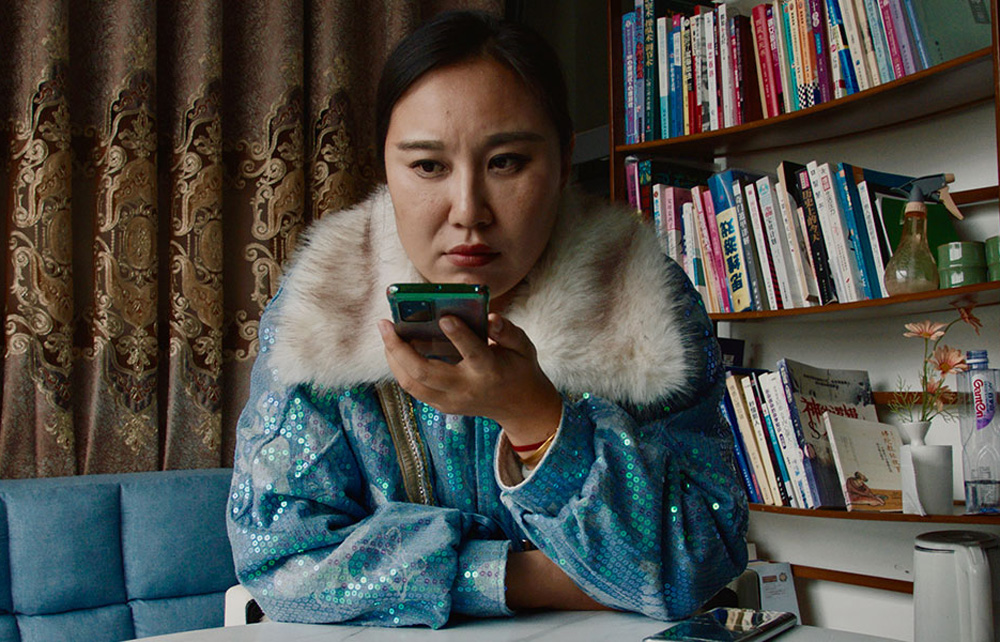True to what follows, it’s appropriate that there’s a little deceit in the title “Mistress Dispeller,” Elizabeth Lo’s fascinating follow-up to her beloved 2020 dog doc “Stray.” Those who might be intrigued by an irresistible logline promising a look into the business of infidelity investigators in China could find that the titular figure Teacher Wang is as elusive in the film as she is in the lives of her clients, serving a similar purpose of facilitating action in both as she coaxes confessions out of unfaithful spouses and subsequently attempting to save marriages by extracting the third party from the affair. As Teacher Wang tells her assistant at one point, “Who I am and what I do is of zero importance,” and though that point is arguable after seeing her efficient handiwork, she is not one to advertise what she does.
Instead, Lo uses the intriguing line of work to gain entry into a more sprawling and ultimately more satisfying subject of marriage, following Teacher Wang into the lives of Mr. and Mrs. Li, the latter of whom has procured her services after believing her husband might be sneaking out on her. Their individual situation isn’t particularly noteworthy – he appears to have lost interest in her, based on the evidence of a suspicious text message and barely looking up to see her new haircut during dinner – but whether or not Mrs. Li is right to give Teacher Wang a call, the possibility of an affair opens up a can of worms considerably larger than anyone could imagine. Confrontations first between the couple and then between Mr. Li and Teacher Wang, after being introduced to him under the guise of being a friend of Mrs. Li’s brother, have the grim and bracing voyeuristic appeal of an episode of “Iyala Fix My Life,” but presented at an appropriately uncomfortable length, you are also allowed to see why someone would hire Teacher Wang to intercede and absorb as much of the painful exchanges as possible.
One might wonder why both Mr. and Mrs. Li stay in such an unhealthy relationship, especially when Lo keeps their children offscreen and mostly off the table as part of the story, but “Mistress Dispeller” confirms its director’s talent for observing grander cultural currents through a highly specific lens. When “Stray” saw its three canine protagonists become a reflection of the Turkish society they were a part of, Mr. and Mrs. Li represent something bigger, even beyond China when they place the security of a partnership over their own individual happiness, a concession to economics and tradition rather than their personal desires.
Interstitial scenes surrounding Mr. and Mrs. Li’s regular routine hint at how marriage remains an important goal in the country at large where an old-fashioned version of OK Cupid can be seen in the streets where singles write down their personal information to attach to clotheslines, but the idea familiar to any millennial anywhere that it could be entirely out of reach for younger generations who have to work in a gig economy simply to stay afloat and surely too busy to look for love is introduced as Teacher Wang – and by extension, Lo – turns her attention towards Fei Fei, the young woman believed to be having an affair with Mr. Li when she’s not running food deliveries around Zhangzhou.
Even in individual frames, Lo acting as her own cinematographer, has a keen eye for questioning the institution of marriage, making sure that even in a throwaway shot of wedding pictures being taken that the person tasked with blowing wind into the hair of the bride and groom to pretty up the image stays in the picture. However, with editor and co-writer Charlotte Munch Bengtsen (“All That Breathes,” “The Act of Killing”), the director presents a compelling and comprehensive case for how the pressure to marry has reinforced inequities of both gender and class when the demand for Teacher Wang’s services appear to not only preserve marriages but a certain social order. A satisfying resolution for any of its participants may look increasingly impossible to come by, but the broader implications of “Mistress Dispeller” are what become so worthwhile in realizing there’s always another presence in the room when it comes to matters of the heart as societal considerations can’t be set aside. When it’s you holding that space as a viewer peering into a marriage, the film gives back as much weight as is placed on its subjects, opening up plenty to think about as a culture prepossessed by notions of coupling.
“Mistress Dispeller” will next screen at the Toronto Film Festival at the Scotiabank on September 6th at 5:30 pm, September 7th at 9:05 pm and September 14th at 6:05 pm.




